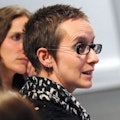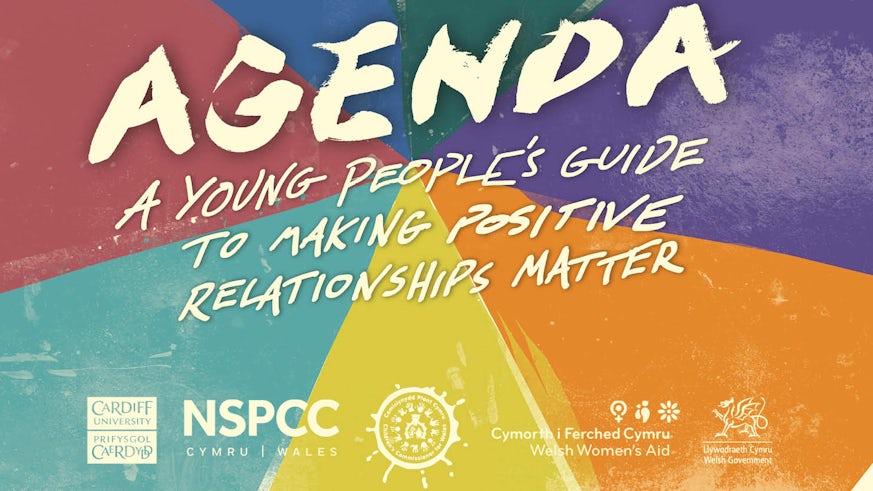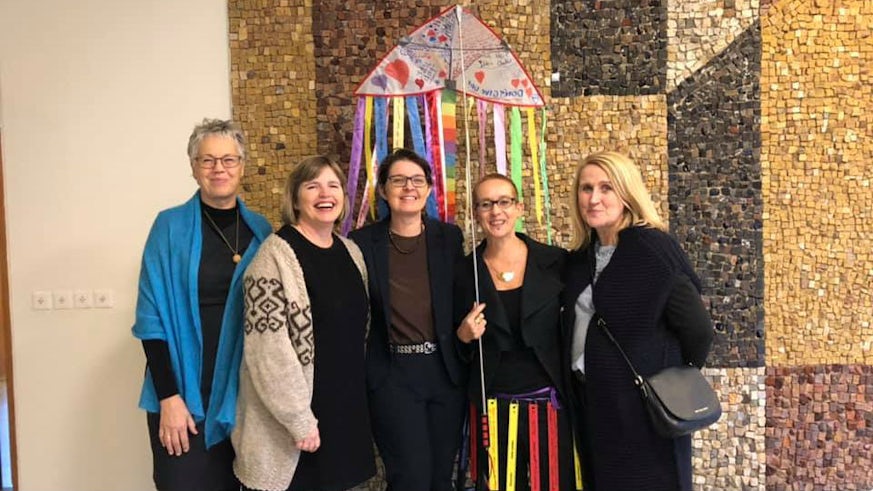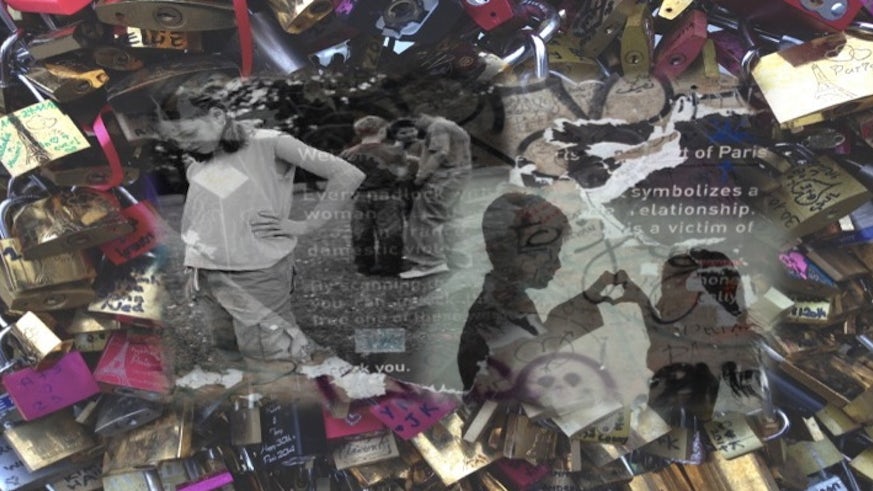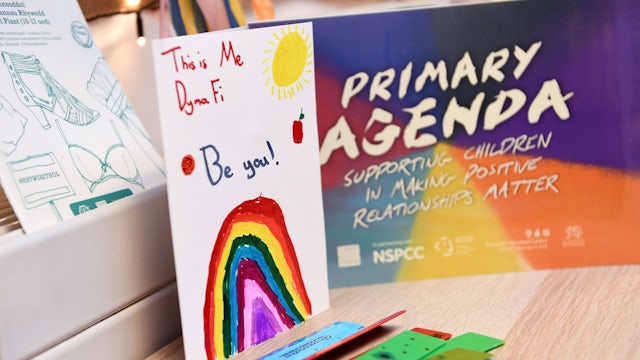
Transforming relationships and sex education in Wales, England, and internationally
Professor EJ Renold’s work has made sure the views of young people are central to new legislation and policies.
“The most powerful research comes from creating methodologies that can listen to and learn from the complexity of children and young people’s lived experiences.”
Professor EJ Renold is a world-leading expert in gender and sexuality studies in childhood and youth. Their research and engagement has formed the basis for the new Relationships and Sexuality Education (RSE) curriculum in Wales, which will be statutory from the ages of three to 16. The co-produced RSE resource, AGENDA, based on extensive engagement and activism with young people, has been internationally recognised and accessed by thousands of people.
A career in academia was not a consideration when Professor Renold started as an undergraduate. Their degree at Cardiff University was initially in English Literature and Music. Their enjoyment of the Education modules they took in their first year led to a change in focus.
“I have always been interested in the expressive arts and what bodies can do,” Professor Renold explains. “I was a ballet dancer and national gymnast as a child. I qualified as a gymnastic coach at age 14, and choreographed dozens of floor routines, which including selecting and editing soundtracks, so I was learning very early on how combining movement and sound allows you to express yourself beyond the spoken word.
“I was also a child who crushed quite a few gender stereotypes – I was quite small for my age, but super strong and super flexible! I was also a kid who was happier in trousers than a skirt – I remember fighting to change our school’s uniform policy so that girls could wear trousers.
“Taking up Theatre Studies, Music and English Literature at A Level allowed my interest in the expressive arts as well as gender and sexual inequalities to meet and develop.”
Professor Renold’s intention from there had been to become a primary school teacher. Their third-year dissertation – focusing on the gendered semiotics of school lunchboxes – was a turning point. This project deepened their understanding of the multiple ways in which children were navigating the cultural representation of gender.
“This was the first time I had conducted my own ethnographic research into the gendered power plays in young children’s lives. I was learning fast how very little ethnographic research there was into children’s gender and sexual cultures in the primary school.”
They achieved a First in their degree – and this prompted them to continue on to pursue a PhD. Professor Renold’s study on gender, sexuality and relationships in the world of primary school children was ground-breaking.
“My PhD was one of the first school-based ethnographic studies in the UK to put the voices of children centre stage in how they were navigating the complex and contradictory world of gender and sexuality in their own peer cultures, and how the school could be a key site of prevention, protection and change.”
However, Professor Renold never set out to be an academic, and the PhD journey was a struggle.
“Embarking on a PhD in an area that is both risky and under-researched was challenging. Like many PhDs, especially ethnographic research projects, it took me a while to complete. As someone who was more confident communicating with my body or with music than with words, I struggled. In fact, I was so shy, and hated public speaking so much, that I left twice during my PhD, and nearly didn’t make it to the viva! However, in 1999, I passed with no corrections.”

When the media moral panics into pre-mature sexualisation prompted multiple government inquiries, Professor Renold’s research and expertise really came into its own and their interest in working creatively and co-productively to develop and communicate research took off.
“I made some quite strategic decisions to bring equalities, children’s rights, wellbeing and protection together in addressing ‘sexualisation’ – something which hadn’t really been done before when making policies about children’s gender and sexual wellbeing.
“I also started to curate events, drawing on my background in theatre studies – events that brought school children, academics, politicians, policymakers, and teachers into dialogue with one another. And over time, I began working more and more with artists to create methods that could better listen to and learn from what matters to children on sensitive topics.”
Over many years, this research and work with schools, youth groups, third sector agencies, artists, and policymakers led to the development of an arts-activist resource, AGENDA – a guide, co-produced with young people. The resource can be drawn upon to support young people to explore a variety of topics including feelings and emotions, friendships and relationships, body image, consent, and gender and sexuality equalities and rights.
A highlight for the project came in 2018 when Professor Renold joined First Minister Carwyn Jones at the United Nations in New York to discuss how Wales is advancing gender equality.
Professor Renold communicated the impact of the AGENDA resource, and in particular the power of creative methods for addressing sensitive topics. One of the most notable is the graffitied ruler-skirt made by a group of teen girls who wanted to call out the ubiquitous nature of sexual harassment in school, online, and in their communities.
Sparked by a throw-away comment of how some boys use rulers to lift up girls’ skirts, the group decided to raise awareness of the issue by making a skirt out of rulers – each ruler graffitied with messages of abuse and messages for change.
“The ruler-skirt was a real catalyst in kick-starting the AGENDA resource. It was where I began to notice the emotional power of how research-activist objects can carry experience into new places and space to effect change long after a project has ended. This skirt has interacted with hundreds of people, from all walks of life. And it has also sparked many more ruler-skirt activisms on a variety of topics, from gender equalities to LGBTQ+ inclusive RSE.”
This work also led to Professor Renold being invited to chair the Sex and Relationships Education Curriculum Expert Panel set up by then-Cabinet Secretary for Education Kirsty Williams. In May 2018, Williams accepted all of the Panel’s recommendations as set out in the Panel Reports, including a major overhaul of Wales’ RSE curriculum – reports that include many of the research-engagement AGENDA case studies.
The findings highlighted the significant gap between children and young people’s lived experiences and concerns, and the RSE they were receiving in school. AGENDA’s methods offer the practical tools schools need to find new ways to listen from young people and share what matters in safe and creative ways. From next year, Relationships and Sexuality Education will be embedded in each area of learning across the Welsh curriculum, from the humanities to science and technology, and will be statutory from the ages of three to 16. It will be supported by clear professional learning pathways for teachers, in both initial teacher training and within the existing workforce.
The curriculum will be underpinned by the core principles set out in the panel reports and refined in the statutory guidance, which states it must cover rights and equity; empowerment; LGBTQ+ inclusivity; protection; creativity; co-production. It also outlines that learning must be holistic; developmentally appropriate and relevant to children’s lived experiences .
Professor Renold has continued to support the development of the new curriculum and guidance as an ongoing advisor and consultant to the RSE Working Group, and through their ongoing professional development work with teachers.
AGENDA continues to develop and expand. The work has been shared with policymakers from as far afield as Iceland, and adapted internationally in Ireland, the USA, Finland, and Australia.
In Wales, in 2019, it was made into a practical guide for educators working with children aged seven to 18 years. The bilingual resource has been endorsed and embedded into practice by key Welsh Government organisations, supporting teachers to develop sessions which provide engaging and affirmative spaces for young people to speak out on what matters to them through a range of formats, such as visual arts, poetry, dance and drama.
The National Education Union (NEU) has also funded the development of additional practitioner resources for its 450,000 members across the UK.
“In many ways, I’ve returned to the creativity at the very start of my academic journey – harnessing the power of the expressive arts to support young people to feel, think, question, and share sensitive or difficult issues,” says Professor Renold.
“Drawing on the creative activities in the AGENDA resource has been vital to support teaches in attuning to what matters to children using arts-based techniques, so that personal issues can be aired and shared in safe and anonymous ways.”
In 2021, Professor Renold received the the Learned Society of Wales’s Hugh Owen Medal for outstanding educational research in Wales, for their work on gender and sexuality education.
That work continued throughout the pandemic, with additional resources and films being developed to support schools as teaching and learning moved online during the lockdowns. EJ’s professional learning programme also moved online, the results of which were shared at Wales’ first online RSE conference for practitioners, supported by Lynne Neagle, the minister for Mental Health and Wellbeing. It was attended by over 300 teachers across Wales and over 15 RSE organisations.
Professor Renold says: “One of the themes of the conference was how RSE is all around us. Every day, there is a hidden curriculum in the making as children and young people navigate an ever-changing world of how sex, gender, sexuality and relationships are shaping their lives.”
They add: “What I have learnt over the past 25 years working in the field of RSE, is not just that we need to co-produce the methods we use to listen to young people, with young people, but that we need to be both responsive and responsible with what young people tell us. And it’s creativity all the way! This approach allows us to stay curious about what needs to change and how.”
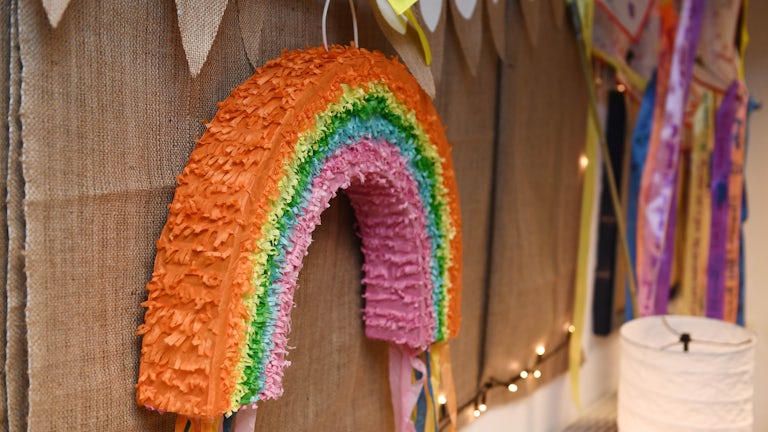
Making positive relationships matter
The AGENDA resource, designed for educational practitioners, encourages an inclusive, creative, and rights-based approach to gender, sexuality, and relationships.
People
Impact over time
Find out more about the impact of Professor Renold’s research over the past few years.
Publications
- Renold, E. , Ashton, M. R. and McGeeney, E. 2021. What if?: becoming response-able with the making and mattering of a new relationships and sexuality education curriculum. Professional Development in Education 47 (2/3), pp.538-555. (10.1080/19415257.2021.1891956)
- Renold, E. et al. 2020. The making, mapping and mobilising in Merthyr project: young people, research and arts-activism in a post-industrial place. In: McDermont, M. et al., Imagining Regulation Differently: Co-Creating Regulation for Engagement. Bristol: Policy Press. , pp.127-144.
- Renold, E. 2019. Ruler-skirt risings: Becoming crafty with how gender and sexuality education research-activisms can come to matter. In: Jones, T. , Coll, L. and Taylor, Y. eds. Uplifting Gender and Sexuality Education Research. Basingstoke: Palgrave Macmillan. , pp.115-140. (10.1007/978-3-030-24205-3_6)
- Bragg, S. et al., 2018. 'More than boy, girl, male, female': Exploring young people's views on gender diversity within and beyond school contexts. Sex Education 18 (4), pp.420-434. (10.1080/14681811.2018.1439373)
- Renold, E. 2018. 'Feel what I feel': making da(r)ta with teen girls for creative activisms on how sexual violence matters. Journal of Gender Studies 27 (1), pp.37-55. (10.1080/09589236.2017.1296352)
- Libby, et al., 2018. Making our feelings matters: using creative methods to re-assemble the rules on healthy relationships education in Wales. In: Lombard, N. ed. The Routledge Handbook of Gender and Violence. London and New York: Taylor and Francis. , pp.303-319.
- Renold, E. and McGeeney, E. 2017. The future of the sex and relationships education curriculum in Wales: Recommendations of the Sex and Relationships Education Expert Panel.. Project Report.Cardiff: Welsh Government
- Renold, E. and McGeeney, E. 2017. Informing the future of the Sex and Relationships Education Curriculum in Wales. Project Report.Cardiff: Cardiff University
Further information
Resources
- AGENDA, supporting children and young people in making positive relationships matter
- CRUSH, transforming relationships and sexuality education
Research blogs
- Launching a new RSE resource for teachers in Wales and Beyond, Kate Marston, 2020
- Sex and relationship education should be about rights and equity not just biology, EJ Renold, 2017
- Children are leading the way on tackling sexual harassment in schools, EJ Renold, 2017
- Boys and girls speak out on sexism and sexual harassment
Videos
- Research Support for Relationships and Sexuality Education, a 2020 video about the new Relationships and Sexuality Education (RSE) that will be embedded in the Welsh curriculum from 2022.
- RSE Gallery, a film capturing images from children and young people on what and how they want to learn about in their school-based Relationships and Sexuality Education (RSE).
- Life Support, a collaborative project with 8 young people, workers from Forsythia Youth, two academics (EJ Renold, Cardiff University, and Gabrielle Ivinson, Manchester Metropolitan University), and two artists (Heloise Godfrey-Talbot and Rowan Talbot). It was part-funded by the ESRC/AHRC Productive Margins Programme.
- Graphic Moves, the digital story of an exhibition of artworks created by young people to explore their relationships with their community.
- What if #thisisme?, a digital story of the gender justice research-engagement project #THISISME, supported and funded by Welsh Government and Cardiff University.
- Making Space, which features one of the 23 schools who have participated in the Central South Consortium’s Relationships and Sexuality Education professional learning programme designed and delivered by Professor Renold.
- Every Body Matters, the digital story of the case study EveryBODY Matters: feeling difference and diversity with movement, sound and image.
- Under Pressure?, the digital story of using the ‘forces’ curriculum in physics to explore consent and coercive control through sound, movement, and a glitch app.
- Body Swing, a 2015 short film featuring movement artist Jên Angharad as she swings through an exhibition of film, sculpture and sound.




